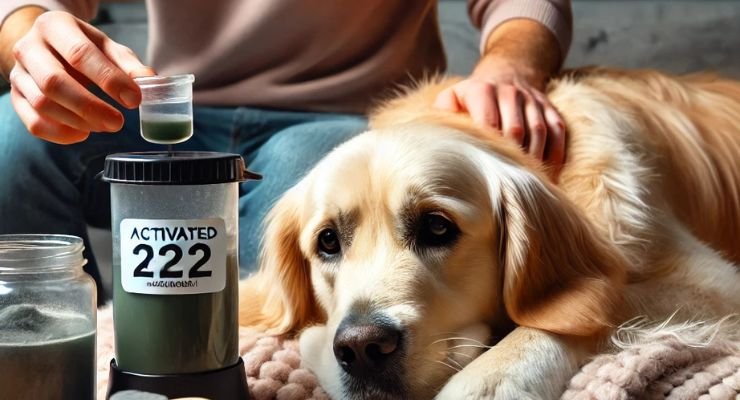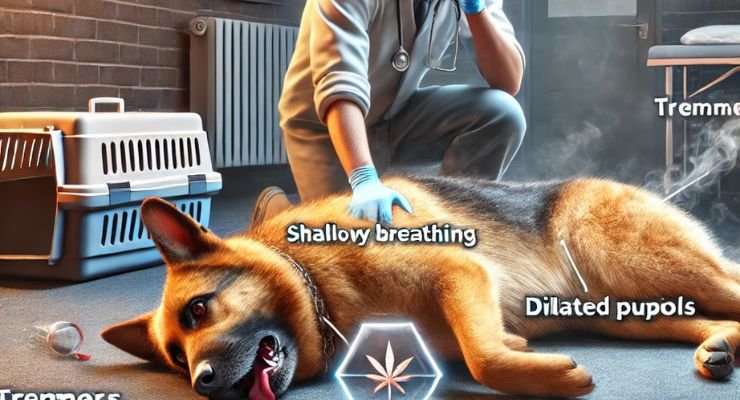
THC, or tetrahydrocannabinol, is the main connection in cannabis that causes psychoactive effects. It interacts with the receptors in the brain and changes mood, perception, and coordination. While humans can handle THC in controlled amounts, dogs have a very sensitive system. How does THC affect dogs? Unlike humans, dogs metabolize it differently, making them more sensitive to the effects. Even small amounts of THC can cause serious health problems in dogs, leading to THC toxicity in dogs and requiring immediate care. Is THC toxic to dogs? Yes, even minor exposure can cause severe symptoms, including confusion, vomiting, and loss of balance.
In Canada, dog marijuana poisoning cases have increased due to the common consumption of THC. Since 2018, cannabis has been legal in Canada, and many people keep it in their homes. This increases the chances of accidental ingestion by pets. Many cases of marijuana toxicity in dogs happen when they eat cannabis-infused food like brownies, gummies, or cookies. Some dogs may also inhale the smoke that people exhale while smoking cannabis, which has a huge impact on them. With the increase in cannabis use, there has been a noticeable rise in the number of dogs experiencing dog THC overdose, making awareness and prevention more important than ever.
At-home treatment is important for mild cases, as some dogs can recover with simple care. A home remedy for dog overdose can help ease mild symptoms, but not all situations can be managed at home. Severe cases need immediate veterinary help to prevent serious complications. Knowing when home treatment is enough and when to take your dog to a vet is crucial. In this blog, you will learn about what THC poisoning in dogs is, the common signs that your dog has THC poisoning, the things that you can do if your dog has THC poisoning, and effective home remedies for THC poisoning in dogs, the critical symptoms that require you to take your dog to a vet, and lastly, some of the simple ways to prevent THC toxicity in dogs.
What Is THC Poisoning In Dogs?

THC poisoning happens when a dog consumes marijuana or breathes in cannabis smoke. Many people often wonder how does THC affects dogs. Unlike humans, dogs have a much more sensitive system, so even a small amount of THC can be quite dangerous for them. Their bodies take longer to process THC, which means the effects last much longer compared to humans. This causes confusion, lack of coordination, vomiting, and, in severe cases, serious health problems. Common sources of dog marijuana poisoning include cannabis edibles, dried marijuana plants, oils, and even secondhand smoke from people smoking cannabis nearby. Dogs, especially curious ones, may find and eat these products, not realizing the danger.
Now, if you are thinking, “Is THC toxic to dogs?” then the answer is yes; THC is very harmful to dogs because it affects the nervous system. It can lower blood pressure, slow the heart rate, and cause extreme drowsiness. Some dogs may become overly anxious or have trouble walking. This is why THC toxicity in dogs is a growing concern, especially in places where marijuana is legal. While mild cases may improve with a home remedy for dog overdose, severe cases need immediate vet care to avoid complications. Understanding marijuana toxicity in dogs and keeping THC products out of reach can help prevent a dog THC overdose and keep pets safe.
Signs Your Dog Has THC Poisoning

If your dog has been accidentally exposed to dog marijuana, then there are certain signs that display THC toxicity in dogs. These symptoms can range from mild to severe, depending on the amount consumed and the size of your dog. Some dogs may show early signs within an hour, while others might take longer. Recognizing these symptoms early can help you decide if a home remedy for dog overdose is enough or if your pet needs emergency care. Below, you will see the common signs of marijuana toxicity in dogs:
Early Symptoms:
- Drooling excessively.
- Walking unsteadily or stumbling.
- Pupils appear larger than normal.
- Feeling very tired or weak.
- Slow to react to sounds and movement.
Moderate Symptoms:
- Vomiting or feeling nauseous.
- Heart rate is slower than usual.
- Overly sensitive to noise or light.
- Muscle twitching or slight tremors.
- Unable to control bladder properly.
Severe Symptoms:
- Having seizures or convulsions.
- Extremely weak and unresponsive.
- Losing consciousness or being in a coma.
- Breathing becomes slow or irregular.
How Long Do THC Symptoms Last In Dogs?
The effects of THC toxicity in dogs can last between 12 to 24 hours. However, in severe cases or if the dog consumes a high amount, symptoms may persist for more than a day. If your dog shows serious signs like seizures or unconsciousness, immediate veterinary care is needed to prevent a dog THC overdose.
What To Do If Your Dog Has THC Poisoning

If your dog has been exposed to dog marijuana, then you need to act quickly to help prevent any serious health problems. THC toxicity in dogs can range from gentle to extreme, so knowing the right steps to take is important. Below, you will see what you should do to help your dog recover safely.
1. Stay Calm And Remove Any Remaining Cannabis
The first thing you need to do to help your dog is to stay calm and not start panicking. Stay calm and focus on removing any marijuana toxicity in dogs by getting rid of leftover cannabis. If your dog ate an edible, check the ingredients to see if it contains chocolate or xylitol, as these are also toxic to dogs. If possible, figure out how much your dog consumed. This information can help if you need to call a vet. Also, make sure that there is no cannabis smoke in the air, as secondhand exposure can make THC toxicity in dogs worse. Once you have removed all sources, you can focus on your dog’s symptoms.
2. Monitor Symptoms And Assess Severity
Keep a close eye on your dog’s behaviour. If your dog only shows mild symptoms like sleepiness or wobbling, you may be able to try a home remedy for dog overdose. However, if your dog starts vomiting, has tremors, or shows signs of extreme weakness, the situation may be more serious. Ask yourself: How does THC affect dogs differently? Unlike humans, dogs cannot handle even small amounts well, so their symptoms can quickly become dangerous. If your dog’s condition worsens or you are unsure what to do, contacting a vet is the best decision.
3. Hydration And Food: Encourage Water And Light Snacks
It is essential to make sure that your dog stays hydrated. Is THC toxic to dogs? Yes, and one of the best ways to help your dog recover is by giving them water. Small sips of water can help flush out dog THC overdose effects, but do not force your dog to drink. If your dog is willing to eat, offer plain food like boiled rice or chicken. Avoid giving heavy meals as THC can slow digestion. Keeping food and water nearby will help prevent dehydration and keep their energy stable.
4. Keep Your Dog In A Quiet, Safe Space And Avoid Stress
A peaceful environment can help your dog recover faster. THC can make dogs confused and anxious, so it is best to keep them in a quiet, dimly lit area. Too much noise or movement can make THC toxicity in dogs worse, especially if your dog is sensitive to sound. Make sure your dog is lying on a soft surface and is not at risk of falling. Stay with your dog to provide comfort, but avoid too much handling if they seem agitated. Creating a stress-free space can help them feel safe and recover faster.
Effective Home Remedies For THC Poisoning In Dogs

Dogs can accidentally consume dog marijuana through edibles, secondhand smoke, or plants. If this happens, you might be looking for a home remedy for dog overdose. While some natural methods can help, it is important to know what works and what does not. Below, you will find remedies that may help manage THC toxicity in dogs at home.
1. Activated Charcoal
Activated charcoal is sometimes used to prevent toxins from being absorbed into the body. When given soon after ingestion, it may help reduce marijuana toxicity in dogs by trapping THC in the digestive system and stopping it from entering the bloodstream. However, activated charcoal should only be given if advised by a vet. Using too much can lead to dehydration or stomach issues. It is not a cure for dog THC overdose, but in some cases, it can be a helpful tool when used correctly. Always check with a professional before trying this method.
2. Encouraging Urination
Helping your dog urinate more often may speed up the removal of THC. Extra fluids, like fresh water or vet-approved electrolyte solutions, can support kidney function and help clear THC toxicity in dogs. However, do not force your dog to drink if they refuses. If your dog is still active, short walks can also encourage urination. Some pet owners believe that light broths or water-based fruits like watermelon can help keep hydration levels up. While this method does not remove THC instantly, it can support your dog’s body in the detox process.
3. CBD As A Counterbalance
Some people believe that CBD can balance the effects of THC; however, this has not been fully proven. CBD and THC interact with the same receptors in the brain, but they work differently. While CBD may help calm anxiety caused by marijuana toxicity in dogs, it does not remove THC from the system. Giving CBD without a vet’s guidance may not be safe, especially if your dog is already showing serious symptoms. Instead of relying on CBD, it is better to focus on hydration, monitoring, and rest to help your dog recover safely.
4. When To Use A Vet-Approved Detox Supplement
There are detox supplements designed for pets, but not all are safe or effective. Some products claim to speed up the removal of dog marijuana, but without vet approval, they can do more harm than good. If your dog is experiencing mild symptoms, a home remedy for dog overdose may help, but if symptoms worsen, a vet-approved detox treatment may be needed. These supplements often include ingredients that support liver and kidney function, but they should only be used under professional guidance. Before trying any detox supplement, always check with your veterinarian.
Critical Symptoms That Require A Vet Visit

If your dog’s THC overdose becomes severe, it is important to seek veterinary help right away. Symptoms like outbreaks, quakes, and extreme inactivity mean that your dog’s body is struggling to handle the effects of THC toxicity in dogs. Some dogs may also have trouble breathing, a dangerously slow heart rate, or unresponsiveness. These signs show that the toxicity is too strong for home care. Delaying treatment can make the condition worse, so it is best to get professional help as soon as possible.
At the vet, your dog will receive treatments to remove the marijuana toxicity in dogs safely. The vet may use IV fluids to flush out the toxins, medications to control seizures or vomiting, and close monitoring to check vital signs. Many pet owners worry and ask, “Is THC toxic to dogs to a fatal level?” In most cases, it is not deadly if treated in time. However, complications can arise if a small dog eats a large amount or if the dog has other health issues. Quick vet care gives the best chance for a full recovery.
Simple Ways To Prevent THC Toxicity In Dogs

Preventing THC toxicity in dogs is simple if you take the right steps. Dogs are curious and may eat anything they find, including cannabis products. Even a small amount can cause serious reactions. It is important to keep all forms of dog marijuana away from pets and be mindful of secondhand exposure. Below are some easy ways to protect your pet from marijuana toxicity in dogs.
- Proper Storage Of Cannabis Products: Keep edibles, oils, and dried cannabis in sealed containers and store them in high places where dogs cannot reach.
- Avoid Secondhand Smoke Exposure: Never smoke near your dog, as they can inhale THC, which may lead to symptoms of dog THC overdose.
- Train Your Dog To Avoid Unknown Substances: Teach your dog commands like “leave it” so they do not pick up anything dangerous on walks or at home.
Conclusion
THC poisoning in dogs is a serious issue that requires quick action and careful monitoring. While mild cases may improve with home remedies like hydration, rest, and a stress-free environment, severe symptoms demand immediate veterinary attention. Understanding the risks, recognizing early signs, and keeping THC products out of reach can help prevent accidental ingestion. If your dog ever shows concerning symptoms, seeking professional advice is always the safest choice. By staying informed and proactive, you can protect your pet from the dangers of THC toxicity and ensure their health and well-being. Always prioritize prevention to keep your furry friend safe.

